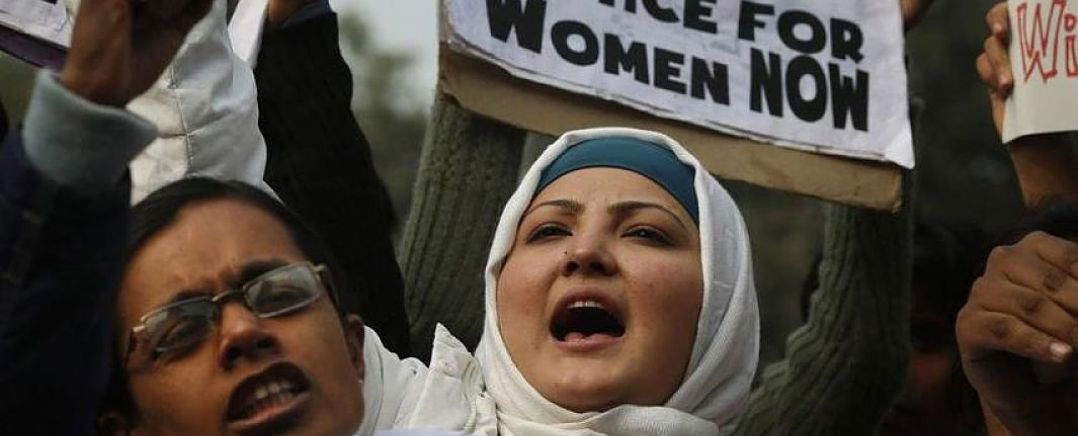newest article

Qiwama and Gender (In)Justice
14 November 2018 8:00 am // Written by Nurhannah Binte Irwan;
The Muslim woman has always been situated within politicised, ideological debates of liberation / oppression and righteousness / damnation. To many in the West, she is the visual symbol of an inherently misogynistic religion that deprives her of autonomy and self-realisation – she is always “constituted as a figure of subjugation, embedded and controlled by a community” (Crabtree and Husain, 2012:148). On the other hand, it is not uncommon to hear the essentialising of the ‘West’ as the immoral ‘Other’ that seeks to ‘modernise’ the Muslim woman and cause her to abandon her religious values and ‘natural’ responsibilities, in pursuit of ‘liberal’ and ‘feminist’ values of gender equality.
In positioning men and women as individuals and as servants of God, the Quran explicitly denies any inherent supremacy of one gender over the other. Rather, it enforces gender equality by describing both men and women “as equal human beings in their origin, created from ‘the same soul’ (nafs waahidah) both making up the human race together, as equal partners” (Omar, 2014: 102). Islam allows both men and women their basic fundamental rights – their right to education, to live with honour, and so on. Both genders are also equally accountable for their every action, speech and thought before God, and will be rewarded or punished accordingly on equal grounds. But why do some people – Muslims included – still believe that men are inherently superior to women from an Islamic point of view?
Such views are mainly derived from their understanding of what Barbara Stowasser refers to as “the pivotal Qur’anic verse on gender relations” (1998:32).
“Men are qawwaamuun of women by [right of] what Allah has given one over the other and what they spend from their wealth. So righteous women are devoutly obedient, guarding in secret that which Allah would have them guard….” (Q4:34)
There are other concepts – obedience, nushuz and beating – in this verse that would, and have warranted more deliberate discussions. However, for the purpose of this paper, I will focus only on the concept of qawwaamun. In interpreting qawwaamun alone, there are various opinions by different exegetes. The exegete al-Ṭabari (d. 923), interpreted men’s qiwama – which he defined as authority/ guardianship – in this verse as being “premised on the material preference that men had been granted” (Shaikh, 1997:7). He is thus conceptualizing qiwama as something “contingent on a socioeconomic phenomenon rather than some inherent quality of man or woman per se” (Shaikh, 1997:7).
However, other Islamic exegetes like al-BayṬhawi (d.1286) and Ibn Kathir (d. 1373) interpreted qiwama as men’s justified superiority due to their “innate abilities and their acquired qualities” (Shehada, 2009:28). Al-BayṬhawi and Ibn Kathir hence contributed to an important development in the exegesis of the verse, as “God’s preference for men over women moves beyond a merely functional preference to one of essence” (Dunn and Kellison, 2010:17).

Many modern scholars are more inclined to build on the interpretation of al-Tabari. In their reading, the verse does not prescribe qiwama as definitive based on biological roles. Riffat Hassan, for example, sees qiwama as an economic privilege. It is hence essentially prescribing a practical division of functions – women are the child bearers, and hence “during that time when they are undergoing the process of childbearing they should not have the obligation of being breadwinners, and therefore men should be breadwinners during this period” (Hassan, 1988, as cited in Abbas and Riaz, 2013:8). Ismail Faruqi shares a similar view. He is thus in the opinion that due to the different socioeconomic conditions now, “women are no longer dependent on their husbands” and that the husband’s economic superiority is “subject to change.” (Abbas and Riaz, 2013:8).
For those like Azizah al-Hibri, they are of the view that men’s qiwama over women is conditional only in these instances: (1) where God has endowed a male (in a certain circumstance or at a certain time) with a feature, ability or characteristic which a particular woman lacks (and presumably needs in that circumstance or at that time) and (2) that male is maintaining that particular woman (Al-Hibri, 1997:30).
According to this view, the qiwama of men is therefore not to be understood as a privilege, but a taklif – a burden, a responsibility – especially in cases where women were financially dependent (Al-Hibri, 1997), and had led sheltered lives. A man is thus responsible to support such women, offering them “guidance and advice in those areas in which he happens to be more qualified or experienced” (Al-Hibri, 1997:30).
The views that postulate qiwama as conditional seem to be more in line with an important guiding Quranic verse which establishes the equality of humankind, beyond their social categories. The verse makes it clear that while there are many favours of God that He bestows on His creatures in different measures – wealth, status, looks, physical abilities, health and so on – there is only one favour which determines the superiority of one human over another: taqwa or God-consciousness. The verse in question is this:
“The nobler among you in the sight of God is the more muttaqi (righteous) among you.” (Q49:13)
Thus the fact that a man is bestowed with favours in some ways more than a woman – as per the verse – does not automatically make him superior to her. And as of all favours of God, it is not unconditional and should not be used as a basis to subordinate and oppress those who are not bestowed with the same. Hence, in describing the most intimate relationship between man and woman, which is marriage, the Quran establishes that spouses are created from the same kind. They are described as affectionate companions, each other’s garments and mutual protectors. And in all these descriptions, the husband and wife are seen as interdependent and complementary. They are bounded not only by the contract that permits their sexual relationship, but also by the higher objectives of “peace, love and mercy”, as depicted by the following verse:
“And of His signs is, that He has created for you wives from your own species that you may find peace with them, and created love and mercy between you. Surely in this there are many signs for those who reflect” (Q30:21)

So if Islam has established this reciprocal and mutual need of the husband and wife in a marriage, why do we still find that there are differences in the roles and responsibilities of husbands and wives in some verses of the Quran and also the hadiths? As Muslims, we believe that each gender “has special qualities that, in general, lead each gender to be better qualified for a particular role” (Alwani, 2013, para 24). Most women have the biological ability to give birth and are more inclined to take up nurturing roles. Men must hence fulfil the financial responsibility of the needs of the family. It is a practical assignment of roles based on these natural inclinations. However, it must be emphasised that these roles are not mutually exclusive, as “it is a natural part of life for variance to exist between people concerning their strengths, abilities and qualifications” (ibid). There should not be hesitations to allow women to step beyond the traditionally prescribed roles of childbearing and nurturing, or for men to embrace such roles on their part. And this why Islam has not stopped, and instead emphasizes women’s rights to education, work, and their socio-economic and political development (ibid). We have seen how Muslim women throughout the history of the ummah, including during the time of the Prophet, have played significant roles in fields beyond the domestic domain.
It is hence crucial to understand that both men and women, even in their roles as husbands and wives, are in principle on “the same pedestal of social, legal and moral equality as human beings” (Omar, 2014:104). There can be, and at times, there could even be a need for differentiations between roles and responsibilities of men and women in the family system. This differentiation, however, must be guided by the principle of equality and justice. We cannot deny that due to the changing contexts, family structures and economic and social milieu, we have come to a point that calls for the need for a rethinking of the roles, rights and responsibilities which we have traditionally ascribed to men and women.
In order to do this, we have to begin by “questioning the most traditional legal positions as well as the statements and standpoints of early scholars about women” (Ramadan, 2009:229). There is a need to distinguish between what was said in the texts and the lived realities of the exegetes and scholars, which could have dictated the direction of their interpretations, as seen in the varying interpretations of qawwaamuun. The classical scholars at that time were more focused to determine women’s function by listing down their rights and duties “according to the various functions society imparted them” (Ramadan, 2009:211) as ‘daughters’, ‘wives’, ‘mothers’ etc. It is hence important to revisit these well-meaning intentions and attempts of giving them an honourable position or social standing in society through these ‘natural roles’, so that it would now suit the context of today’s women who have taken up roles beyond these assumed ‘natural’ functions. Women do not only enter paradise because of their sacrifices as mothers, good wives and daughters. Beyond all these roles which they may or may not take up, women are firstly independent, spiritual individuals in their own right.
It is therefore not a foreign imposition and influence for Muslims to demand for gender justice and to pursue a social structure in “which character, good work, and piety – not gender – are the defining factors of social authority” (Fawcett, 2013:np). Islam is an integral part of many of its followers, and should not be pitted against the pursuit of gender justice. In fact, there is a more pressing religious need to ensure that no Muslim woman is subjugated to misogynistic discourses and values using Islam as a poor justification to one’s own biases. It is a religious commitment to God to ensure that justice prevails over misogynist worldviews, which would then have consequences on how women are perceived and treated within the Islamic framework.
References:
- Abbas, Muhammad Zaheer, and Riaz Shamreeza (2013). “Diversity of Interpretations Regarding Qawwam in Islamic Thought with Special Reference to Surah An-Nisa”. Pakistan Journal of Islamic Research Vol 11, p. 2-20.
- Al-Hibri, Azizah (1997). “Islam, Law and Custom: Redefining Muslim Women’s Rights”. American University International Law Review 12(1), p. 1-44.1
- Alwani, Zainab (2013). “The Qur’anic Concept on Gender Relations”. Retrieved 1st December 2016. < http://www. zainabalwani.com/quranic-concepts-ongender-relations/>
- Crabtree, Sara Ashencaen and Husain, Fatima (2012). “Within, Without: Dialogical Perspectives on Feminism and Islam”. Religion and Gender, 2(1), p. 128- 149
- Dunn, Shannon and Kellison, Rosemary B. (2010). “At The Intersection of Scripture and Law: Qur’an 4:34 and Violence Against Women”. Journal of Feminist Studies in Religion, 26(2), p. 11 – 36
- Omar Shagufta (2014). “Qawamah in Islamic Legal Discourse: An Analysis of Traditionalist and Modernist Approaches”. Islamabad Law Review 1.1 (Jan-Jun 2014), p. 99-129.
- Fawcett, Rachael (2013). “The reality and future of Islamic feminism: What constitutes an “Islamic feminism”, and where is it headed?” Aljazeera, 28 March. Retrieved 1st December 2016. <http://www.aljazeera.com/indepth/ opinion/2013/03/201332715585855781. html>
- Ramadan. Tariq (2009). “Radical Reform: Islamic Ethics and Liberation”. New York: Oxford University Press.
- Shaikh, Saa’diya. (1997). “Exegetical Violence: Nushuz in Quranic Gender Ideology”. Journal for Islamic Studies, 17, p. 49-73.
- Shehada, Nahda (1990). “House Of Obedience: Social Norms, Individual Agency, and Historical Contingency”. Journal of Middle East Women’s Studies, 5(1), p. 24-49
- Stowasser, B. (1998) “Gender issues and contemporary Quran interpretation”, in Haddad, Yvonne and Esposito, J. (eds), Islam, Gender, and Social Change, Oxford: OUP, p. 30–44.
ISLAMIC PERSPECTIVE SOCIETY ISLAM AND WOMEN EQUALITY FEMINISM INJUSTICE WOMEN QIWAMA CONTEMPORARY ISSUES










